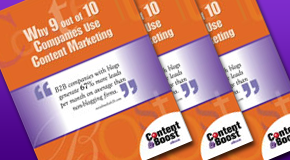You’ve created what you think is a solid SEO strategy, but you’re still not seeing the results you expected. So you add new keywords and ramp up your web design, only to come up short once again. If this sounds all too familiar, don’t worry. You’re not alone.

SEO has become increasingly difficult for marketers; yet it still remains a top priority. That’s because in today’s world— in which 93 percent of online experiences begin with a search engine—playing nice with search engines is the only way to remain competitive.
So what’s the secret to better rankings? The answer is high-quality content. Thanks to Google’s newest updates, past SEO tactics such as keyword stuffing and link exchanges no longer work. Search engines are focused on delivering users the best experience possible, meaning they’re on the hunt for high-quality content that’s relevant, educational and valuable.
Enter content marketing. Content marketing attracts and retains customers through the creation and dissemination of valuable content. When integrated with your SEO strategy, content marketing can help drive traffic and boost rankings. In fact, 92 percent of SEO marketers say that content creation is an effective SEO tactic and 76 percent regularly invest in content creation, according to a recent infographic commissioned by Sekari.
However, creating content just for the sake of it won’t get you any closer to the top of Google’s rankings. It’s got to be clear, concise and meaningful. Below are three questions to keep in mind when creating high-quality content:
- Does it solve a problem? When you go to Google or Bing, chances are you have a need to fulfill or problem you want to solve. Whether it’s learning how to cure your sunburn or deciding whether you should buy a laptop or a tablet, you have a “question” you need answered. Keep this in mind when crafting content. Provide your target audience with content that helps solve their biggest challenges or pain points. For example, “how-to’s,” “tips and tricks,” and “101 guides” are all types of content that helps engage readers.
- Is it educational? After engaging with a piece of content, readers should walk away having learned something new—otherwise, what’s the point? Your content should be informative and educational. But be careful; using complex jargon can be a huge turnoff, while dumbing it down too much makes you look like amateur. Find a way to be both educational and entertaining.
- Are you making a point? As a marketer, it’s easy to get lost in your own words. Oftentimes, we focus so much on the “what” that we fail to address the “why.” Make sure your content has a point. Before writing, map out two or three points that you want to drive home. Remember, your readers don’t have time to waste.















